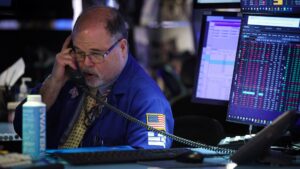The Economic Ripple Effects of Federal Spending Cuts: Insights from Investor Danny Moses
At the Extreme Investor Network, we believe that understanding the macroeconomic landscape is crucial for making informed investment decisions. Recently, renowned investor Danny Moses, who made headlines for his successful bet against mortgage-backed debt ahead of the 2008 financial crisis, shared some concerning insights on the current state of the U.S. economy during an appearance on CNBC’s "The Exchange."
Moses raised alarms about the ongoing federal spending cuts, spearheaded by the Department of Government Efficiency. According to him, these cuts are not being fully appreciated for their potential negative impact on the economy. “I think we are underestimating the impact of the cuts we’re making at the federal government,” Moses stated, emphasizing the potential knock-on effects. As an investor with a track record of prescience, his worries should resonate with anyone watching the markets closely.
Understanding the Immediate Risks
Moses pointed out that the cost-cutting measures—most notably those influenced by influential figures like Tesla CEO Elon Musk—could lead to significant layoffs that would directly erode corporate revenue growth in the near term. The reduction of federal workforce numbers, which Moses estimates to be over 60,000 across various agencies, has implications far beyond just government productivity; it’s likely to stifle consumer confidence and spending.
“When you’re sitting at a debt-to-GDP ratio of over 120%, you really can’t afford to make any mistakes,” Moses cautioned. This statement underscores the precarious balance we are currently navigating. As the market grapples with uncertainties and fluctuating investor sentiment, many believe the ramifications of these spending cuts are not yet fully reflected in stock valuations.
Market Dynamics and Recovery Trends
It’s worth noting that President Trump’s protectionist trade policies have historically stirred concerns over an economic slowdown, leading to a recent pullback in the S&P 500 index. After dipping into a correction phase, the index has since clawed back some losses but remains approximately 8% below its all-time high reached earlier this year. The recovery, however, may be short-lived if the effects of government spending cuts begin to materialize more visibly.
Moses suggests that when first-quarter earnings reports come in, we may start to see indicators of a slow market and further erosion in consumer confidence—factors that the current market sentiment fails to account for effectively.
A Diversified Investment Approach: Gold and Online Gambling Stocks
Despite the sobering economic outlook, Moses expressed his continued bullish stance on gold, particularly as it surges past the remarkable $3,000 mark. Gold has always been seen as a safe haven in times of economic strife, and Moses’ endorsement of this asset class adds weight to its status as a hedge against inflation and economic instability.
Additionally, Moses is optimistic about the online gambling sector, specifically highlighting companies like Genius Sports. He believes this industry is somewhat insulated from the tumultuous effects of aggressive tariffs and has the added advantage of being early adopters of artificial intelligence. As the regulatory landscape around online gambling continues to evolve, opportunities may abound for investors keen on diversifying their portfolios.
Conclusion: Stay Informed with Extreme Investor Network
As we navigate through potential economic pitfalls and opportunities, it’s crucial to stay informed and consider various perspectives, like those offered by Danny Moses. At Extreme Investor Network, we’re dedicated to bringing you insights that matter. Understanding both the challenges and opportunities in the markets is vital to making sound investment decisions.
For more in-depth analysis and expert perspectives on today’s financial landscape, continue to engage with our content. The more informed you are, the better positioned you will be to weather economic fluctuations and capitalize on emerging opportunities.

